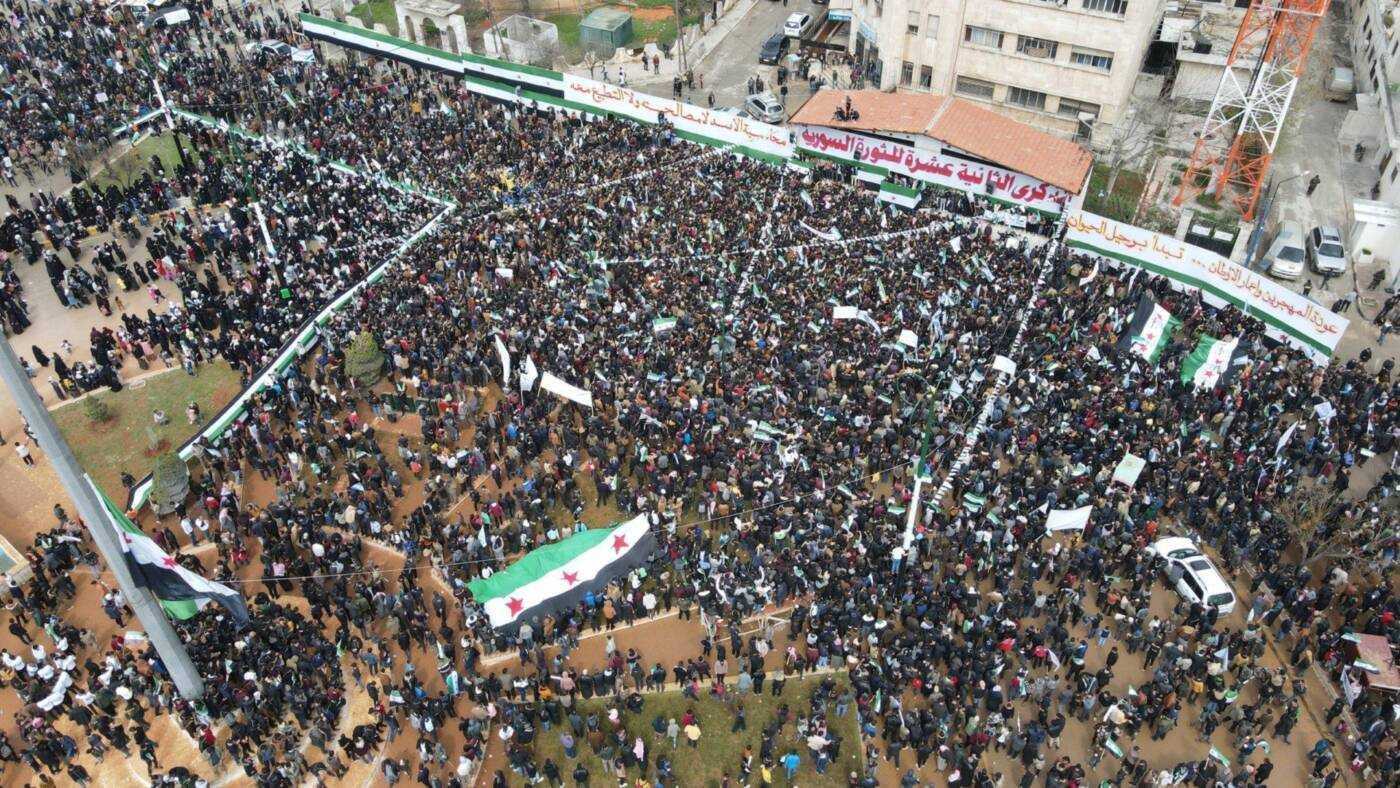On the 12th anniversary of the revolution, Syrians look for a way forward
On the twelfth anniversary of the outbreak of the Syrian revolution in March 2011, “everything is different on the ground from what it was the first year,” its course far from the aspirations of those who took part.
15 March 2023
IDLIB, PARIS — Every year since 2011, Syrians mark the anniversary of the outbreak of the revolution in mid-March. This year, 12 years on, “everything is different on the ground from what it was the first year,” according to Abu Alaa, a displaced person from Homs city.
“The revolution has gone through several stages and changes. There are parties that have tried to tamper with it, but the revolutionary spirit we carried in 2011, our dreams of a better reality for our country, are still with us. They will remain with us in every minute, and every demonstration,” Abu Alaa, 62, told Syria Direct from his residence in Idlib city.
On March 14, the day before the start of events commemorating the uprising’s anniversary, Bashar al-Assad arrived in Moscow to meet with his Russian counterpart, Vladimir Putin, in the context of efforts aimed at ending his isolation and promoting normalization of ties with Damascus. Multiple Arab countries have contributed to these efforts, with the United Arab Emirates (UAE) leading the way.
Abu Alaa is not worried about normalization, “because it will not save the regime,” he said. “What is frightening is the opposition’s service, military and civil position.”
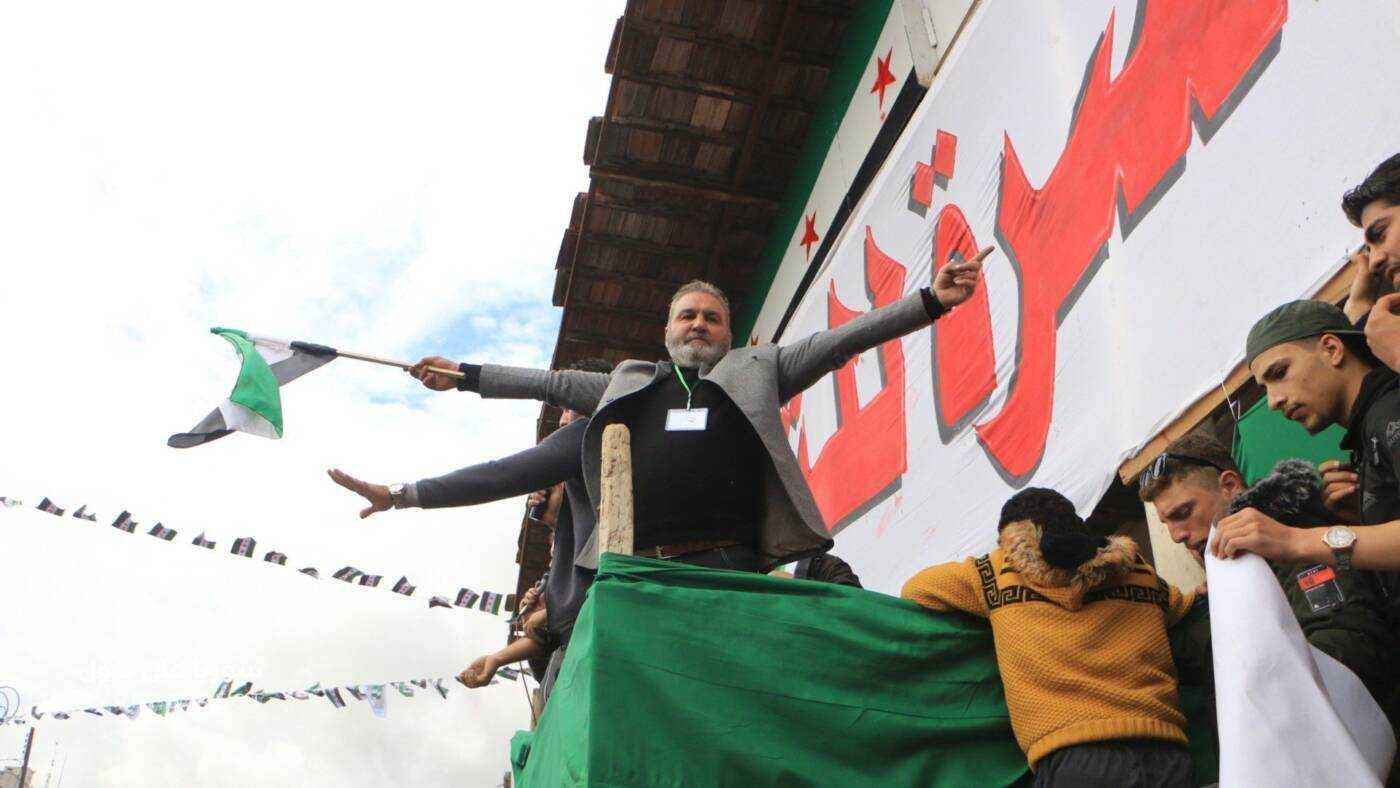
Abu Alaa, 62, displaced from Homs city, raises the Syrian revolution flag while participating in a commemoration of the revolution’s twelfth anniversary in Idlib city, 15/3/2023 (Abd Almajed Alkarh/Syria Direct)
Twelve years after the outbreak of the Syrian revolution, which turned into a war in the face of massive state repression, more than four million people—half of them displaced like Abu Alaa—live in areas controlled by armed opposition factions and Hayat Tahrir al-Sham (HTS) in northwestern Syria. They live in difficult humanitarian conditions, worsened by the February 6 earthquake that struck parts of Syria and Turkey, killing and injuring tens of thousands of people in both countries.
“Despite all the blows, all the suffering we have carried with us for years, we will remain steadfast in our demands for freedom, rejecting tyranny, the monopolization of power and the plunder of the country,” lawyer Rabia al-Harami, 56, said at her residence in Idlib. She has been displaced from her home in the province’s southern countryside since the regime took control of the area in late 2019.
“The revolution continues” is a slogan raised by Syrians during the yearly commemoration, and it is one al-Harami clings to, “12 years after the revolution, with its sweetness and bitterness, despite the heavy price we paid: bombing, displacement and detention,” she told Syria Direct.
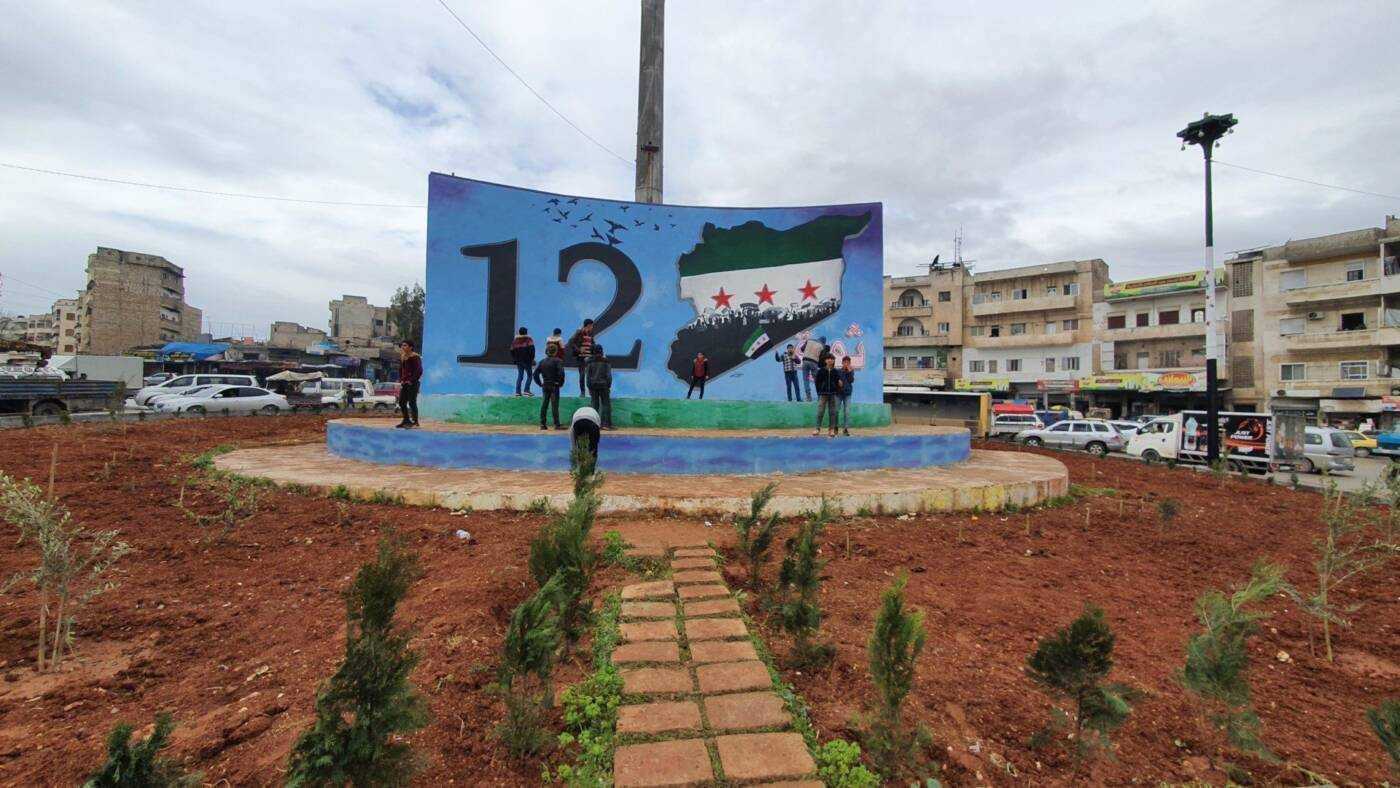
A mural painted in a square in Idlib city commemorating the twelfth anniversary of the Syrian revolution, 15/3/2023 (Abd Almajed Alkarh/Syria Direct)
The Syrian Network for Human Rights (SNHR) issued a report on Wednesday, tracking the most prominent human rights violations in Syria from March 2011 to March 2023. It documented the killing of at least 230,224 civilians, including 30,007 children and 16,319 women, by parties to the conflict and controlling forces in Syria. Among them, 201,055 civilians, including 22,981 children and 11,976 women, were killed by the Syrian regime, according to SNHR.
Returning to the original course
Damascus tops the list of the perpetrators of violations in Syria, but all parties to the conflict have committed violations—including opposition factions that consider themselves the representatives of civilians opposed to Assad.
According to the SNHR report, 4,206 civilians, including 1,007 children and 885 women, were killed by opposition factions over the past 12 years, including by the Turkish-backed Syrian National Army (SNA) that controls the northern Aleppo countryside.
Separately, HTS, the hardline group that controls most of Idlib province and portions of Idlib and Latakia provinces, killed 517 civilians, including 74 children and 79 women, SNHR reported.
Areas controlled by opposition factions and HTS have recorded a series of violations, notably by the Turkey-backed SNA. These include restrictions on the media, assassinations and infighting between opposition factions.
It is for that reason that, when talking about the revolution, it is necessary “to return it to its proper path, and consider the goals that people came out for” in 2011, and “let go of all the disagreements or problems that distract Syrians, and exhaust them inside the country,” Salim Abu Rashid, 27, told Syria Direct from his residence in Idlib city.
Abu Rashid, displaced from the Damascus countryside city of Darayya in 2016, believes that, 12 years on, “the revolution is not on the right path, but is floundering in domestic and foreign problems, going through hard times of external interference and internal instability,” as he put it.
Still, “there is no alternative to achieve our dreams and goals, which we paid for with lives and blood, and which took away what we hold most dear,” Abu Rashid said. Those goals can only be achieved, he said, by “Syrians gathering around one message, with a leadership that can decide nationally, one that does not obey orders from abroad, and does not undermine the principles of the people and the goals they came out for.”
Before the revolution broke out in March 2011, Abu Rashid was a high school student in Darayya, comfortable socially and economically. But during the years of the revolution, he lost his father, “martyred in detention,” and now lives apart from his family, “scattered inside and outside of Syria.”
Many situations he experienced during the years of the revolution are etched into Abu Rashid’s memory. He remembers the Darayya massacre in August 2012, in which more than 500 civilians were killed by the regime, the siege of his city and the displacement of those who remained in it in August 2016.
These painful memories, and the difficult living conditions of Abu Rashid and other Syrians in northwestern Syria, leave him more insistent on the need to correct the revolution’s course, and set right the mistakes it has fallen into.
For Muhammad Ahmad al-Daour, 38, all the turning points Syria went through over the past 12 years led him to one place: a tent in the al-Azraq camp, in the Idlib countryside town of Maarat Misreen, after he was displaced from the Saraqib countryside in 2019. But he does not regret taking part in the revolution. “The situation with the regime was no longer bearable, with the policy of deprivation, stripping freedoms and injustice,” he told Syria Direct.
But that does not mean he is satisfied with what befell the uprising, after “it lost its agency, and the supporter came to control it, because of Syrians’ lack of experience and the failure to put the right person in the right place,” al-Daour said. Then, as the situation in Syria became frozen, “it left us in the camps, suffering poverty and displacement, with declining support,” he added.
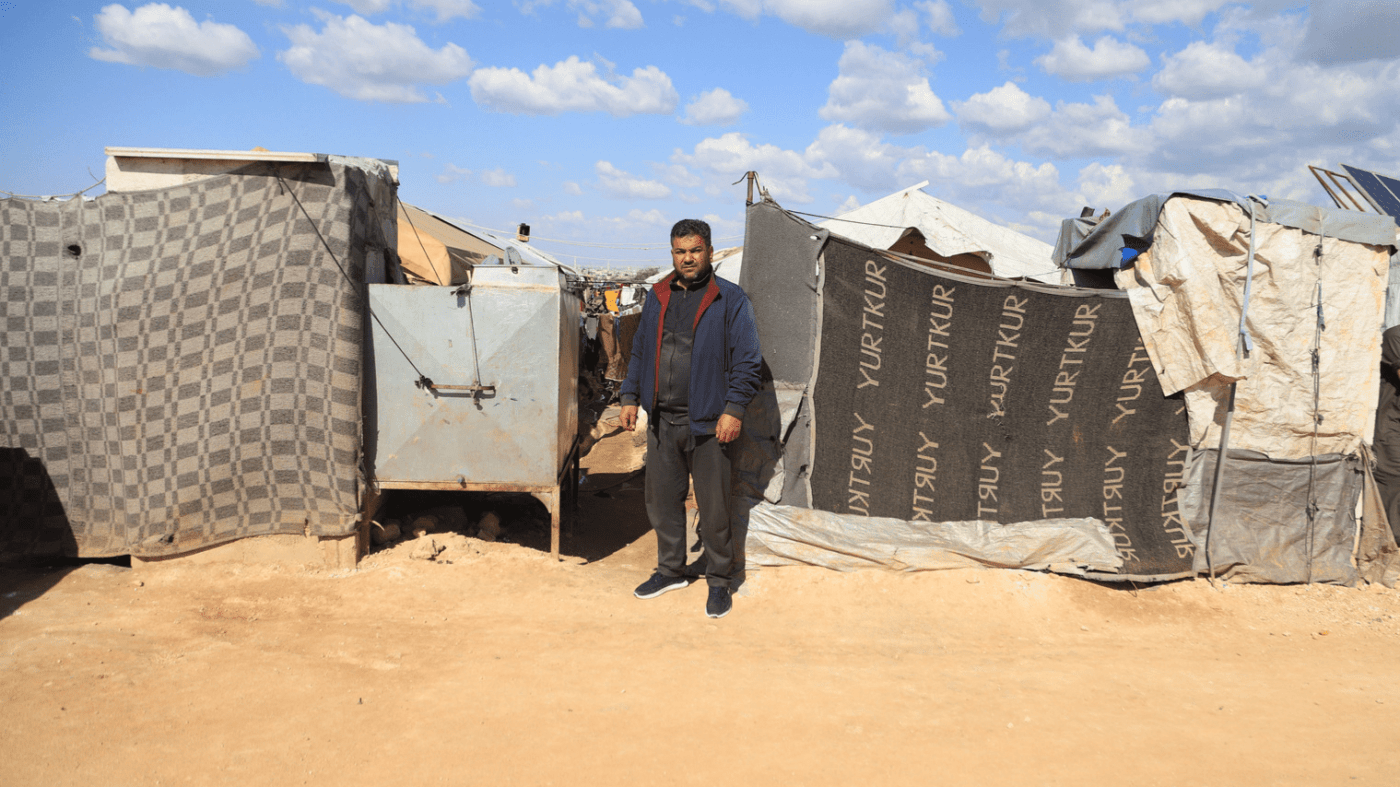
Muhammad Ahmad al-Daour, 38, in front of his tent in the al-Azraq camp, in the Idlib countryside town of Maarat Misreen, 10/3/2022 (Abd Almajed Alkarh/Syria Direct)
Looking for a way out
As a practicing lawyer before 2011, Fahd al-Musa, 53, sensed “the injustice burdening my people in Syria, and the absence of political, economic and social justice.” This sense led him to participate in the revolution as a political and human rights activist, he told Syria Direct.
But 12 years later, “the revolution is no longer on its right path—it has been stripped of agency by people claiming to represent it, and they have no legitimacy to do so,” he said. “The strategic decisions of the revolution have become dependent on Turkey as a guarantor state.”
In her tent in al-Azraq camp, Nada Othman al-Hasram, 49, remembers her village of Maar Shamarin, in the eastern Maarat al-Numan countryside, destroyed by regime bombardment. She has not forgotten the “massacre” committed by the Syrian Air Force in 2012, in which dozens of civilians were killed, “including my sister and her husband,” she told Syria Direct.
Al-Hasram has lived through difficult circumstances since the revolution began: “the bombing and destruction of our village, our displacement from it, ending with us here in this tent, living in hard conditions,” she said.
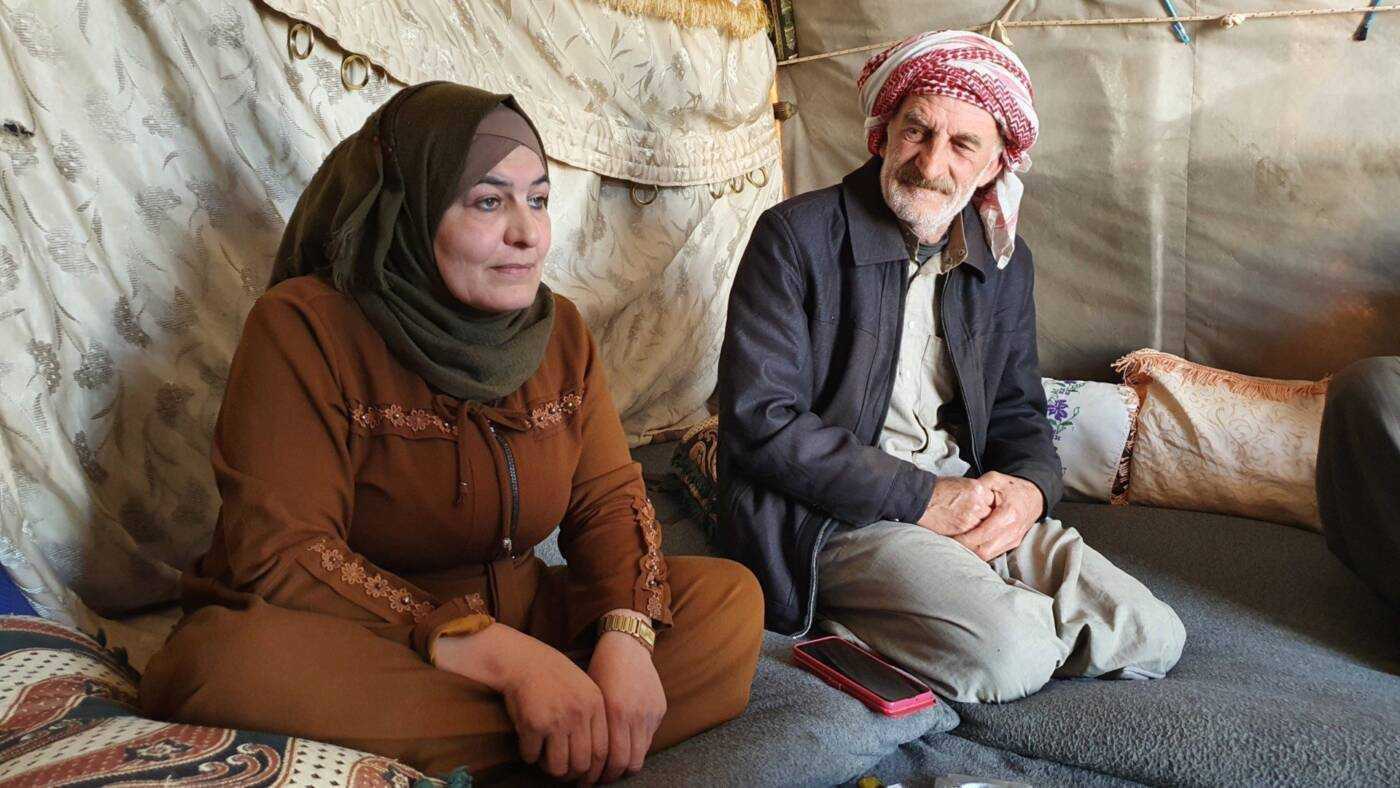
Nada Othman al-Hasram, 49, sits beside her husband in their tent in al-Azraq camp in Maarat Misreen, Idlib, 9/3/2023 (Abd Almajed Alkarh/Syria Direct)
In Maar Shamarin, al-Hasram and her family were farmers. “We grew all kinds of fruits and vegetables on our land. Our conditions were good—we wanted for nothing. Today, our economic situation is below zero,” she said. Her family has been split apart, while before there was “an atmosphere of intimacy and closeness among the family.”
Al-Hasram’s pain is increased by the indifference she feels from official opposition institutions towards the reality of civilians like her in northwestern Syria, as well as the international community’s abandonment of its responsibilities towards Syrians. Her hope is that “the opposition and countries help us return to our villages, from which the regime and Russia expelled us.”
In lawyer al-Harami’s view, the way out for Syrians, especially those displaced in the northwest, is “civil action and a peaceful transition of power according to Resolution 2254,” with “civil action taking its course without military intervention.”
To that end, “a national revolutionary conference [should be] held for all Syrians, who are not dependent on any state, to elect people who can truly represent the revolution,” al-Musa said.
As for accountability for violations committed over the past 12 years, “when a political transition is achieved, a fair and impartial judiciary must be established that can hold the criminals on all sides accountable—especially those affiliated with the revolution who abused it by collaborating or committing crimes against civilians,” al-Musa said.
But for Abu Alaa, displaced from Homs, his only wish “at the age of 62, with the diseases I have,” is that “the people prevail—that every displaced Syrian returns home.”
This report was originally published in Arabic and translated into English by Mateo Nelson

